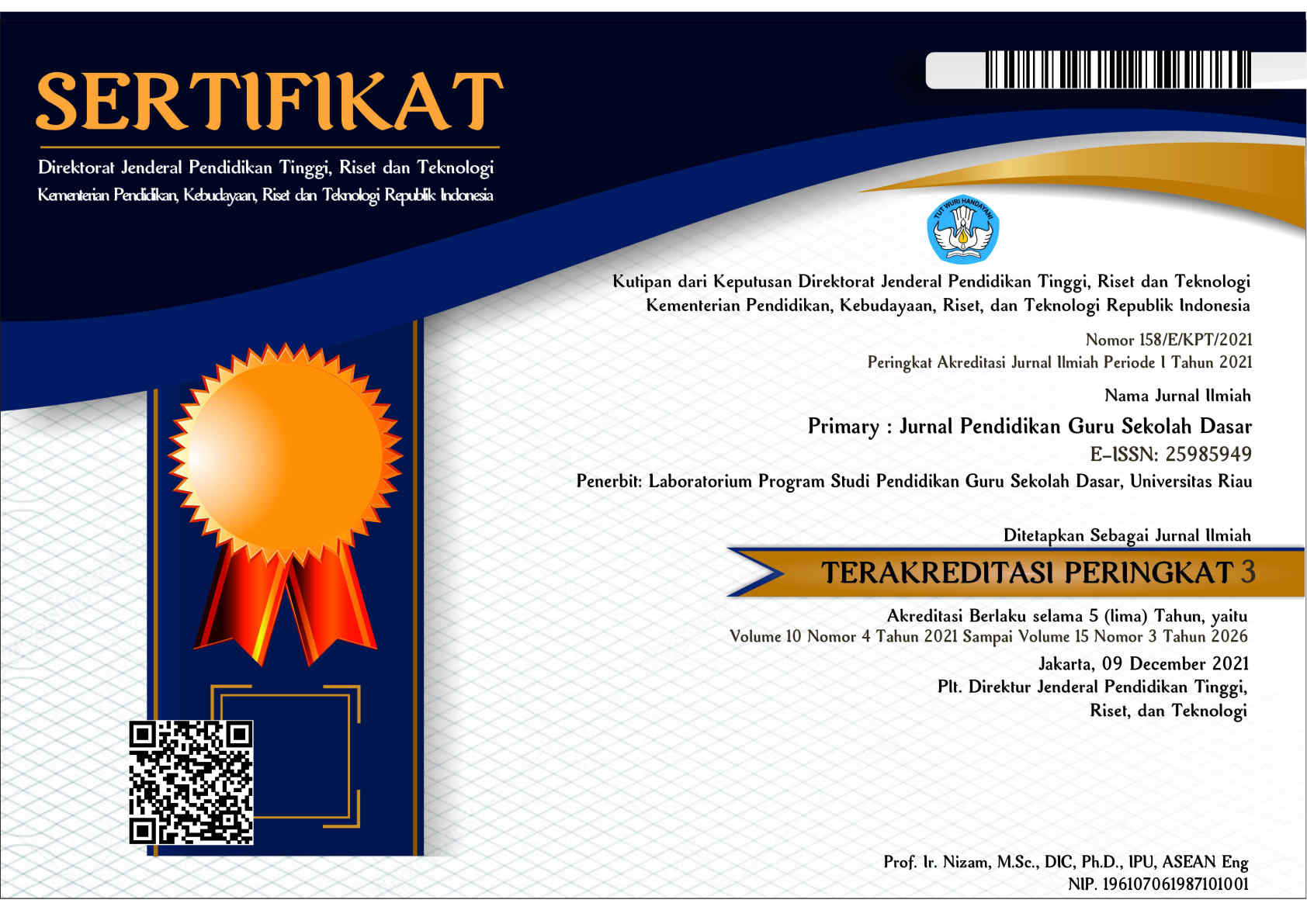VALIDITY ANALYSIS OF THE DIGITAL MATERIAL DEVELOPMENT ON INDONESIAN LANGUAGE SKILLS LEARNING SUBJECT BASED ON MALAY CULTURE FOR PGSD STUDENTS
Abstract
This paper discusses the validity analysis of digital products in Malay culture-based Indonesian Language Skill courses through PjBL for University Elementary School Teacher Education students. The research was conducted in the Elementary School Teacher Education Study Program in July-October 2022. The development model applied in the research of this paper was the research model and educational development developed by Bord and Gall, which consists of three stages namely preliminary studies, product development, and product implementation. In the research of this paper, the researchers limited only the product development stage. The data collection technique used was a research instrument in the form of a validation sheet used by material and media experts in assessing digital teaching materials. Validation instruments were given to media and material experts. Based on the analysis results, it shows that the percentage was obtained completely from the assessment by the validator of digital material development for Indonesian-language skills courses based on Malay culture and PjBL with an average percentage score of 88.82% that is categorized as very suitable to use as digital teaching materials. Nevertheless, there are several parts of the digital material that need to be revised in order to complete the digital material. In the end, the revision results of this digital material can be applied in the Indonesian Language Skills course for the students at PGSD FKIP Study Program in Universitas Riau and can be applied in the lecture system.
Keywords
Full Text:
PDFReferences
Hills, D., & Thomas, G. (2019). Digital technology and outdoor experiential learning. Journal of Adventure Education and Outdoor Learning, 20(2), 155–169. https://doi.org/10.1080/14729679.2019.1604244
Cuthbertson, B., Socha, T. L., Potter, T. G., Cuthbertson, B., Socha, T. L., & Potter, T. G. (2007). Journal of Adventure Education and The double-edged sword : Critical reflections on traditional and modern technology in outdoor education Outdoor Education. January 2015, 37–41. https://doi.org/10.1080/14729670485200491
Yuliana, dkk. (2021). Pengembangan Bahan Ajar Digital Interaktif Dengan Pendekatan Kontekstual Pada Mata Kuliah Teori Ekonomi Mikro. Jurnal Profit: Kajian Pendidikan Ekonomi dan Ilmu Ekonomi. 8(1). 36-46.
Afifullah, M., dan Cahyanto, B. (2021). Analisis Kebutuhan Pengembangan Bahan Ajar elektronik di Era Pandemi Covid-19. Jurnal Pendidikan Dasar Indonesia, 6(2), 31-36.
Magdalena, I., Fauzi, HN., & Putri, R. (2020). Pentingnya Evaluasi Dalam Pembelajaran Dan Akibat Memanipulasinya. Bintang : Jurnal Pendidikan dan Sain, 2(2). 244-257.
Hanik, NR., & Harsono, S. (2016). Peningkatan Aktivitas Dan Hasil Belajar Mahasiswa Pada Mata Kuliah Anatomi Tumbuhan Melalui Model Pembelajaran Komparasi Yang Berbasis Lesson Study. Jurnal Pendidikan Matematika dan IPA, 7 (2) Juli 2016, 25-31.
Septikasari, R., & Frasandy, RN. (2018). Keterampilan 4C Abad 21 Dalam Pembelajaran Pendidikan Dasar. Jurnal Tarbiyah Al-Awlad, 8(2), 112-122.
Redhana, IW.. (2019). Mengembangkan Keterampilan Abad Ke-21 Dalam Pembelajaran Kimia. Jurnal Inovasi Pendidikan Kimia, 13(1), 2239 – 2253.
Kivunja & Charles. (2015). Teaching Students to Learn and to Work Well with 21st Century Skills: Unpacking the Career and Life Skills Domain of the New Learning Paradigm. International Journal of Higher Education, v4 n1 p1-11. http://dx.doi.org/10.5430/ijhe.v4n1p1
Lavi, R., Tal, M., & Dori, YJ. (2021). Perceptions Of STEM Alumni And Students On Developing 21st Century Skills Through Methods Of Teaching And Learning. Studies in Educational Evaluation, 70 (2021) 101002. https://doi.org/10.1016/j.stueduc.2021.101002
Tegeh, I.M., Jampel, I.N., & Pudjawan, K. (2014). Model Penelitian Pengembangan. Singaraja: Graha Ilmu.
H. Yuliana, F., Fatimah, S. Barlian, I. (2021). Pengembangan Bahan Ajar Digital Interaktif Dengan Pendekatan Kontekstual Pada Mata Kuliah Ekonomi Mikro. Jurnal PROFIT: Kajian Pendidikan Ekonomi dan Ilmu Ekonomi, 8 (1), 36-46. https://doi.org/10.36706/jp.v8i1.13875
Hobbs, D. J. (1987). Effects of Content Sequencing and Presentation Mode of Teaching Material on Learning Outcomes. PLET: Programmed Learning & Educational Technology, 24(4), 292–299. https://doi.org/10.1080/0033039870240405
Wilson, M. C. (2018). Crowdsourcing and Self-Instruction: Turning the Production of Teaching Materials Into a Learning Objective. Journal of Political Science Education, 14(3), 400–408. https://doi.org/10.1080/15512169.2017.1415813
Busstra, M. C., Geelen, A., Feskens, E. J., Hartog, R. J. M., & Van ’t Veer, P. (2008). Design and development of digital learning material for applied data analysis. American Statistician, 62(4), 329–339. https://doi.org/10.1198/000313008X368837
Zwart, D. P., Van Luit, J. E. H., Noroozi, O., & Goei, S. L. (2017). The effects of digital learning material on students’ mathematics learning in vocational education. Cogent Education, 4(1), 1–10. https://doi.org/10.1080/2331186X.2017.1313581
DOI: http://dx.doi.org/10.33578/jpfkip.v12i4.9323
Refbacks
- There are currently no refbacks.
Copyright (c) 2023 Eva Astuti Mulyani

This work is licensed under a Creative Commons Attribution-NonCommercial-ShareAlike 4.0 International License.
____________________________________________________________
Primary: Jurnal Pendidikan Guru Sekolah Dasar
Secretariat
Program Studi Pendidikan Guru Sekolah Dasar
Gedung B1, FKIP Universitas Riau
Kampus Bina Widya Km. 12,5 Simpang Baru Panam
Pekanbaru Riau Indonesia 28293
e-mail : primary@ejournal.unri.ac.id



